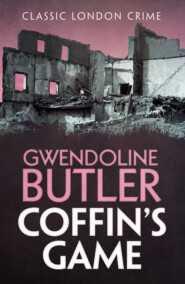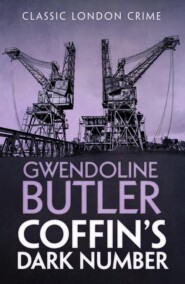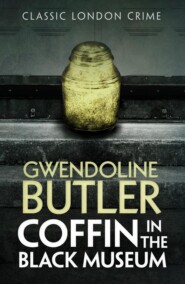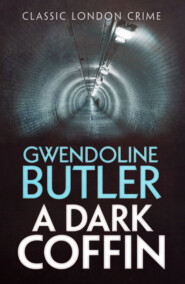По всем вопросам обращайтесь на: info@litportal.ru
(©) 2003-2024.
✖
A Cold Coffin
Автор
Год написания книги
2019
Настройки чтения
Размер шрифта
Высота строк
Поля
‘She could have been hit on the head.’ He got up. ‘First, before the rest, but I don’t think so. The medics will tell us.
It looks as if someone took her by surprise.’
‘No weapon found,’ said Phoebe tersely. ‘Just in case you wondered.’
‘She never came in here. No one did,’ said Joe, not loudly but suddenly, as if he had just thought of it. ‘In all the years I’ve cleaned this place, I’ve never seen anyone. It’s kind of forgotten, this place.’ He turned his short-sighted blue eyes on the Chief Commander and CI Astley. ‘She asked for you, sir. With her dying breath, she asked for you.’
Coffin took it in but did not know whether to believe it: people caught up in violent death had such fantasies.
Probably the worst fantasy of all was that he would be of any use.
He looked around at the floor, at all the skeletal remains that lay about which the killer had abstracted from the cabinets and then thrown all over the floor, except for the skulls, where a pattern had been made.
Or had the dead woman herself taken them out?
No, the little skulls, babies’ skulls, were arranged round her own head. Certainly she had not done that herself.
‘What the hell do the bones and skulls mean?’
Phoebe didn’t answer.
‘No, you don’t know it any more than I do. But whoever did this was angry.’
The SOCO team arrived.
‘You took your time,’ Coffin said crisply.
‘Traffic, sir, sorry,’ said the team leader, far from pleased to see the Chief Commander there. Traffic as an excuse was the first thing he could think of. Not strictly true; a bit of an argument between two of the team had slowed them down. He could see by the look in the Chief Commander’s eyes that he was not believed. If I’d known it was you here waiting for us, I’d have been quicker. But the top brass never knew how those down below felt. There had been a lot of irritation lately, partly because of the new building works, which had meant shuffling people around. The skulls were objects of interest, and yet of disquiet too. The water had drained away so that the archaeologists had been at work, measuring and photographing. Then some other police teams had arrived. Men from the scientific side.
Coffin said, ‘It’s now early evening. I want to know when she was killed. Also, how anyone could get in here. Was it usually kept locked or not? And anything that forensics can turn up.’
‘Are you taking over, sir?’ Phoebe kept her voice polite, although she was irritated by him.
‘No. You are. But I will be behind you.’
Behind and in front and in the air above, thought Phoebe. No one who has worked with him has ever exactly been left alone. And yet we all like the bugger. Did I really call him that in my mind? I shouldn’t have done, because he is always polite, sometimes gentle, even at his most ruthless.
‘Check these skulls . . . what is known about them, who uses them and for what purpose.’
‘A medical purpose, I judge,’ said Phoebe.
‘Dr Murray was not a doctor but an archaeologist.’ But he had answered his own question. Archaeologists dealt in bones too.
He remembered her face as she had looked at that odd little skull with the water washing over it. She had been troubled. No, not exactly troubled: thoughtful, knowing. She had known something about that infant skull.
Coffin knew nothing about infant craniums, and some of those encircling Margaret Murray’s head looked very, very small, and others looked odd.
He knew nothing, but there were those that did.
‘Get a doctor, preferably a paediatrician, to look at these heads and tell me what he says.’
Joe said, ‘You don’t need a doctor.’ But once again he was invisible.
Stella had been left sitting in the car. For a while she was patient, but this patience did not last. She took a deep breath, got out of the car, remembered to lock it, and marched into the hospital building.
She didn’t know where her husband was, nor did she know her way around. One hospital may be much like another one, but you still have to know the signs: no, not the signs that tell you this way to Ear, Nose and Throat Department, or Pharmacy This Way, or Operating Theatre X, Third Floor, but the flow of people, the sense of urgency. A hospital was in a way like a theatre, she thought: the cutting edge, those in charge, otherwise the surgeons and nurses, and the audience, otherwise the suffering, the patients.
I must have drunk more than I realized, she thought. Surely not, I drank very little, and anyway on occasion I have a stronger head than my husband. Depends on emotion. If you are really down, you drink the bottles empty but never get high, but if you are happy half a glass can do it.
So she must have been happy; it was one way of telling.
A hand touched her shoulder. She swung round. A large young woman, fat really, but pretty, carrying a folder of documents or they might have been photographs; you were always getting photographed or X-rayed in hospitals. Or so it seemed in the sort of films and TV soaps that Stella watched, when she watched. Or acted in.
‘Oh, Joanna.’
‘Yes, Joanna. You were looking down at your shoes so hard that you didn’t notice an old friend.’
‘I was trying to make up my mind about them. Someone said they were kinky.’
‘Kinky?’
Joanna studied what Stella was wearing: the shoes were black patent, shiny, high-heeled, with just a hint of something in the white line that ran round the toe.
‘That person was not a friend,’ said Joanna severely. ‘Stella, you could never be called kinky, nor anything you wear. Even by putting them on, those shoes ceased to be kinky.’
Stella looked at Joanna with caution. She was never sure when Joanna was laughing at her. She probably was doing so now, but never mind, she was glad to see her. If surprised.
‘You work here now?’
‘In accounts.’
‘Oh yes, you always were into figures.’
They looked at each other and laughed. The two had met in the early days when Stella was working in Greenwich and Joanna Kinnear was taking her final exams in accountancy, and they met again when she had discovered that Joanna was doing the accounts for the private hospital that had attended to Stella’s facial requirements (mention not the words ‘uplift’ and ‘beauty surgery’). And now here she was in a big hospital, wearing a white coat and looking important. She probably was.
Joanna saw her look. ‘Even hospitals have bills and accounts to keep,’ she said with amusement. ‘In fact, they are big spenders.’
‘Why are you wearing a white coat, though?’
‘Oh, I just like to look a big shot.’
Stella accepted the explanation while not believing it. She knew enough about modern hospitals to know that white coats were out of fashion, laundry costs presumably. No, there was more behind it than Joanna was saying, but not for Stella to enquire.
‘I’ve lost my husband.’
‘Medically, or emotionally?’
‘Practically. He came in to see a skull . . . a baby’s skull.’











